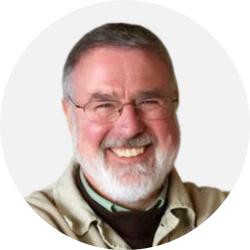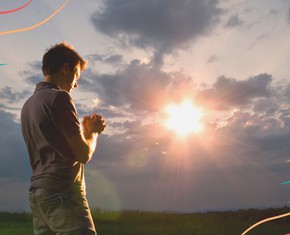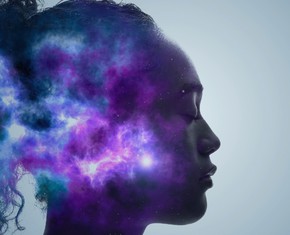The views expressed in our content reflect individual perspectives and do not represent the authoritative views of the Baha'i Faith.
When we live in cultures that increasingly insist on solely material conceptions of reality, then we’re defined only as material beings, and that limited definition excludes a huge part of our human reality.
Yes, we each have a physical body, and we all exist in a materialistic matrix of physical reality — but as the Baha’i teachings point out, those facts describe just one element of our dual human nature:
Man has two powers; and his development, two aspects. One power is connected with the material world, and by it he is capable of material advancement. The other power is spiritual, and through its development his inner, potential nature is awakened. These powers are like two wings. Both must be developed, for flight is impossible with one wing. Praise be to God! Material advancement has been evident in the world, but there is need of spiritual advancement in like proportion.
RELATED: Seeing Beyond Materialism Into a Spiritual Reality
Materialists believe the only true reality is the concrete physical world apprehended by our five material senses. If I can’t touch it, see it, hear it, taste it, or feel it, the materialists maintain, it doesn’t really exist.
Those with a spiritual orientation believe that something more exists — that this material world simply reflects the more real, non-tangible spiritual world. The spiritual view of reality suggests that no real or lasting change can occur in the outer physical realm unless there is a corresponding change in the inner spiritual condition.
Truth, Goodness, and Beauty: What Are They?
Because truth, goodness, and beauty have been interpreted as only material realities, we have a distorted view of who we are and what we should become. Many of us get trapped in that worldview and find it hard to free ourselves from its grip.
However, we also are spiritual beings whose essential reality is what some call the soul and others call consciousness. This non-material, non-tangible, abstract reality gives true meaning to life as our essential and immortal reality. Because we have so neglected that aspect of ourselves, it has atrophied and been silenced by the persistent and insistent demands of our physical reality.
Truth, goodness, and beauty can be found in some limited measure in the physical world — however, their truer and fuller expression can only be experienced by the mind and soul. Real, lasting happiness and well-being can best be found in spiritual pursuits.
But spiritual pursuits can also be misled by superstitions, fanaticism, dogmatism and vain imaginings. The question then becomes: How can we discern truth from falsehood and good from evil?
Science, religion, and the accumulated knowledge of the ages can shed light on this question. We have been endowed with reason and the capacity to investigate reality for ourselves — which means that we have an obligation to do so to the best of our ability. In our age, when we can have access to this knowledge, we should strive to acquire it. We need to progressively cultivate our and others’ capacities to know, to love, and to seek truth, goodness, and beauty.
We must educate and elevate ourselves to be worthy of this task, arising to regenerate and rejuvenate ourselves and our world. By gradually transforming our characters, we, little by little and day by day, create a better world. As Baha’u’llah revealed: “The betterment of the world can be accomplished through pure and goodly deeds, through commendable and seemly conduct.”
When we learn to weigh all matters in the balance of reason, using both true science and religion as our guides, we can overcome the misconceptions and falsehoods that remain unexamined in our belief systems and guard against the prejudices and misconceptions of our times. By striving to gain insight with sincere and lofty motives, we can remove the veils that keep us from recognizing reality and doing good. Our understanding and that of our society is limited and faulty, and only by recognizing that fact are we in a position to make amends and improve.
RELATED: What Is the Purpose of Our Lives?
Our Two Natures
Baha’u’llah wrote that “No man, however acute his perception, can ever hope to reach the heights which the wisdom and understanding of the Divine Physician have attained.”
Who are the “Divine Physicians?” The Baha’i teachings say that they are the prophets and messengers sent to humanity by a loving Creator. Baha’u’llah, who Baha’is regard as the Divine Physician for our age, explained that we have two natures: a material or lower nature, which we all see and experience directly, and a spiritual, inner, or higher nature, which constitutes our true identity. The purpose of our life, the Baha’i teachings say, is to develop our higher spiritual natures.
We do this partly through mastering our lower nature by cultivating the powers of our higher nature. When we follow the spiritual guidance of the Divine Physician, it can free us from the harmful limitations and inclinations of our lower nature, which keep us from true health and well-being.
Just as a worldly physician can aid the development of a healthy body, and just as a healthy body requires that we follow certain laws and practices, so too, the Divine Physician provides the laws and principles necessary for healthy spiritual development. It is our choice whether to follow that profound spiritual guidance.
We, and those around us, bear the consequences of our choices, both positive and negative. Because we live in spiritually unhealthy environments, we must protect ourselves from the contagions that surround us, such as falsehoods, hatred, prejudice, and injustice. This means developing healthy spiritual bodies filled with truth, love, and justice. When we endeavor to follow the teachings of the All-Knowing Physician, we can find our true selves and live happy and productive lives.
You May Also Like
Comments

















"All that are on earth shall pass away, while good deeds alone shall endure."
"Consider the pettiness of men's minds. They ask for that which injureth them, and cast away the thing that profiteth them...
"That which beseemeth man is submission unto such restraints as will protect him from his own ignorance, and guard him against the harm of the mischief-maker...
"Regard men as a flock of sheep that need a shepherd for their protection."
KA §70,122-25
"He hath stated that which is conducive to the conversion, the advancement, the exaltation, and the guidance of men."
Ep., p. ...155
"...that which hath streamed forth from the Most Exalted Pen is...the sovereign remedy for every disease"
ToB, p. 73
"Consider the pettiness of men's minds. They ask for that which injureth them, and cast away the thing that profiteth them...
"That which beseemeth man is submission unto such restraints as will protect him from his own ignorance, and guard him against the harm of the mischief-maker...
"Regard men as a flock of sheep that need a shepherd for their protection."
KA §122-25
"He hath stated that which is conducive to the conversion, the advancement, the exaltation, and the guidance of men."
Ep., p. 155
"...that which hath streamed forth from the Most Exalted Pen is...the sovereign remedy ...for every disease"
ToB., p. 73
"All that are on earth shall pass away, while good deeds alone shall endure."
KA §70